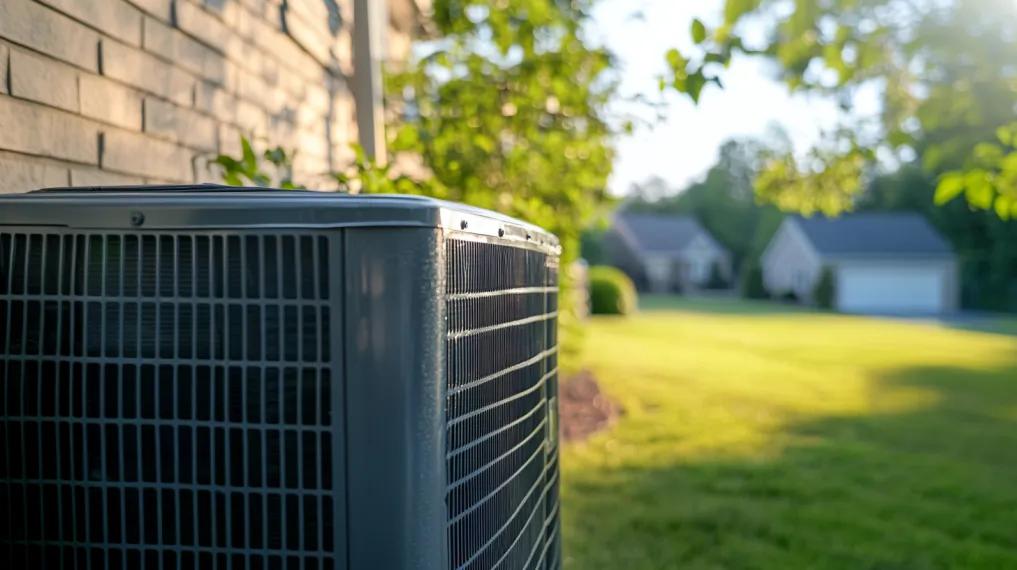How Does an AC Compressor Work?

If you want to understand how your air conditioning system keeps your home cool and comfortable during the summer, it’s best to start with the compressor. Found inside the outdoor condenser unit, the AC compressor plays a crucial role in the refrigeration cycle that makes cooling possible.
HVAC.com breaks down how an AC compressor works, identifies signs that it might need replacing, and covers the costs and factors to consider when repairing or replacing this key part of your central air conditioning system.
The Role of an Air Conditioner Compressor
Without the compressor in your air conditioner, your home would stay warm and stuffy during the summer. To understand how an AC compressor works, let’s look at the refrigeration cycle. It begins with the refrigerant in the indoor evaporator coil, where it absorbs warm air from your home and changes from a cool liquid into a hot vapor.
This heated refrigerant vapor is then pumped to the outdoor compressor, where it’s compressed into a high-pressure gas. The high-pressure gas then moves to the condenser coil inside the outdoor unit, where it releases heat into the surrounding air with the help of a fan. As the refrigerant cools, it condenses back into a liquid, which then returns to the evaporator coil to repeat the cooling cycle.
If the compressor fails, your AC won’t be able to increase the refrigerant’s pressure and temperature, which is essential for moving heat outside. This would interrupt the cooling process and leave your home warm and uncomfortable.
Common Signs Your Compressor Is Malfunctioning
Decreased Airflow
If the air coming from your vents feels weaker than usual, there could be a problem with your compressor or a refrigerant leak. Start by checking your air filter and ductwork for clogs, and replace the filter if needed. If that doesn’t solve the problem, it’s time to call an HVAC contractor, as the compressor could be malfunctioning.
Your Home Won’t Cool Down
If your home isn't cooling down or you’re getting lukewarm air from the vents, the compressor might be the problem. A malfunctioning compressor can fail to release hot air outside, leaving your home feeling warm.
Higher Energy Bills
If your system is blowing weak or warm air, you might see a spike in your energy bills. This happens because the system must work harder and keep running to maintain a cool temperature in your home.
Refrigerant Leak
A refrigerant leak could indicate a problem with the compressor or other AC components. A refrigerant leak can reduce cooling efficiency and damage the compressor, so it’s important to address the issue quickly to avoid further damage.
Strange Noises
Is your AC keeping you up at night or disturbing your daily activities? Aside from the gentle hum of your air conditioner running a cycle, it should be relatively quiet. Any jarring noises such as screeching or banging indicate your compressor or another component isn’t working properly. Contact an HVAC contractor to inspect the noise and make the appropriate repair.
How Long Do AC Compressors Last?
AC compressors last about 12-15 years on average. The lifespan of an AC compressor is primarily affected by factors such as regular maintenance, the quality of installation, and the frequency of use. Problems like refrigerant leaks or poor airflow can also make it wear out faster.
How Much Does It Cost to Replace an AC Compressor?
Unfortunately, AC compressors aren’t cheap. The average price of installing a new compressor, including installation, is between $1,200 and $2,800.
Factors that affect how much you’ll pay for an AC compressor include the brand (with premium brands costing 20-30% more on average), the size of the unit, labor costs, and whether additional parts are needed during the installation such as a new capacitor or additional refrigerant.
Deciding Whether to Replace Only the Compressor or the Entire AC Unit
Deciding whether to replace just the compressor or the entire AC unit depends on the costs and condition of your system. Compressors can be expensive, often costing a significant portion of the price of a new AC unit, which averages around $5,750 for a 3-ton system in a 2,000-square-foot home. If your system is old and inefficient, investing in a new unit may be more cost-effective.
However, if the compressor is still under warranty, which typically lasts about 10 years, replacing just the compressor might be a better option if the rest of the system is still in good shape.